Related Research Articles

Kurdish people or Kurds are an Iranic ethnic group native to the mountainous region of Kurdistan in Western Asia, which spans southeastern Turkey, northwestern Iran, northern Iraq, and northern Syria. There are exclaves of Kurds in Central Anatolia, Khorasan, and the Caucasus, as well as significant Kurdish diaspora communities in the cities of western Turkey and Western Europe. The Kurdish population is estimated to be between 30 and 45 million.

Demographic features of the population of Turkey include population density, ethnicity, education level, health of the populace, economic status, religious affiliations and other aspects of the population.
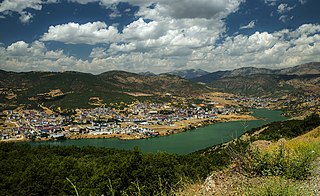
Tunceli is a municipality (belde) in Tunceli District and capital of Tunceli Province, Turkey. The city has a Kurdish majority and was a site of the Dersim rebellion. It had a population of 35,161 in 2021.
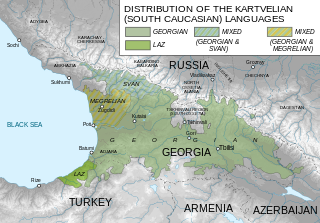
The Laz language or Lazuri is a Kartvelian language spoken by the Laz people on the southeastern shore of the Black Sea. In 2007, it was estimated that there were around 20,000 native speakers in Turkey, in a strip of land extending from Melyat to the Georgian border, and around 1,000 native speakers around Adjara in Georgia. There are also around 1,000 native speakers of Laz in Germany.
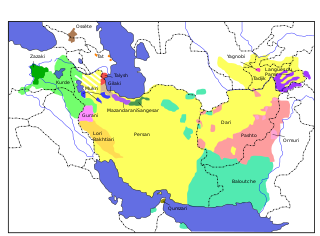
The Zazas are a people in eastern Turkey who traditionally speak the Zaza language, a western Iranian language written in the Latin script. Their heartland consists of Tunceli and Bingöl provinces and parts of Elazığ, Erzincan and Diyarbakır provinces. Zazas generally consider themselves Kurds, and are often described as Zaza Kurds by scholars.

The Kurdish population is estimated to be between 30 and 45 million. Most Kurdish people live in Kurdistan, which today is split between Iranian Kurdistan, Iraqi Kurdistan, Turkish Kurdistan, and Syrian Kurdistan.

The Kurds are the largest ethnic minority in Turkey. According to various estimates, they compose between 15% and 20% of the population of Turkey. There are Kurds living in various provinces of Turkey, but they are primarily concentrated in the east and southeast of the country within the region viewed by Kurds as Turkish Kurdistan.
Turkification, Turkization, or Turkicization describes a shift whereby populations or places received or adopted Turkic attributes such as culture, language, history, or ethnicity. However, often this term is more narrowly applied to mean specifically Turkish rather than merely Turkic, meaning that it refers more frequently to the Ottoman Empire's policies or the Turkish nationalist policies of the Republic of Turkey toward ethnic minorities in Turkey. As the Turkic states developed and grew, there were many instances of this cultural shift.
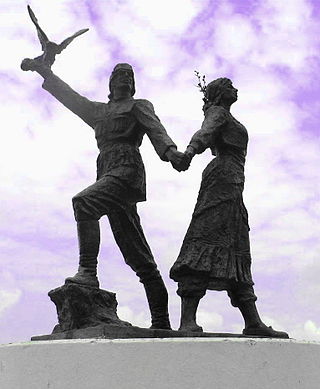
The Laz people, or Lazi, are a Kartvelian ethnic group native to the South Caucasus, who mainly live in Black Sea coastal regions of Turkey and Georgia. They traditionally speak the Laz language but have experienced a rapid language shift to Turkish.
Kurds have had a long history of discrimination perpetrated against them by the Turkish government. Massacres have periodically occurred against the Kurds since the establishment of the Republic of Turkey in 1923. Among the most significant is the massacre that happened during the Dersim rebellion, when 13,160 civilians were killed by the Turkish Army and 11,818 people were sent into exile. According to McDowall, 40,000 people were killed. The Zilan massacre of 1930 was a massacre of Kurdish residents of Turkey during the Ararat rebellion, in which 5,000 to 47,000 were killed.
Kurdish nationalist uprisings have periodically occurred in Turkey, beginning with the Turkish War of Independence and the consequent transition from the Ottoman Empire to the modern Turkish state and continuing to the present day with the current PKK–Turkey conflict.

Turkish nationalism is a political ideology that promotes and glorifies the Turkish people, as either national or ethnic definition. Turkish nationalism is associated with Turkification as a series of cultural and linguistic practices to promote the Turkish language and culture. It also has a complicated relationship with Muslim identity, Pan-Turkism, and Turanism.

Kurdish nationalism is a nationalist political movement which asserts that Kurds are a nation and espouses the creation of an independent Kurdistan from Iran, Iraq, Syria, and Turkey.

Ethnic groups in the Middle East, in the 'transcontinental' region which is commonly a geopolitical term designating the intercontinental region comprising West Asia without the South Caucasus, and also comprising Egypt in North Africa. The region has historically been a crossroad of different cultures and languages. Since the 1960s, the changes in political and economic factors have significantly altered the ethnic composition of groups in the region. While some ethnic groups have been present in the region for millennia, others have arrived fairly recently through immigration. The largest socioethnic groups in the region are Arabs, Turks, Persians, Kurds, and Azerbaijanis but there are dozens of other ethnic groups that have hundreds of thousands, and sometimes millions of members.
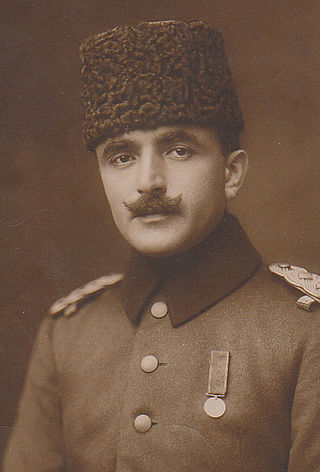
Place name changes in Turkey have been undertaken, periodically, in bulk from 1913 to the present by successive Turkish governments. Thousands of names within the Turkish Republic or its predecessor the Ottoman Empire have been changed from their popular or historic alternatives in favour of recognizably Turkish names, as part of Turkification policies. The governments have argued that such names are foreign or divisive, while critics of the changes have described them as chauvinistic. Names changed were usually of Armenian, Greek, Georgian, Laz, Bulgarian, Kurdish (Zazaki), Persian, Syriac, or Arabic origin.
The Laz people in Turkey are Turkish citizens of Laz descent, an ethnic group native to the eastern Black Sea coast of Turkey and southwestern Georgia.
Zaza nationalism is an ideology that supports the preservation of Zaza people between Turks and Kurds in Turkey. The movement also supports the idea that the Zaza people are a different ethnic group from Kurds.
The Republic of Turkey has an official policy in place that denies the existence of the Kurds as a distinct ethnicity. The Kurds, who are an Iranic people, have historically constituted the demographic majority in southeastern Turkey and their independent national aspirations have stood at the forefront of the long-running Kurdish–Turkish conflict. Insisting that the Kurds, like the Turks, are a Turkic people, Turkish state institutions do not recognize the Kurdish language as a language and also omit the Kurdish ethnonym and the term "Kurdistan" in their discourse. In the 20th century, as the words "Kurd" and "Kurdish" were prohibited by Turkish law, all Kurds were referred to as Mountain Turks in a wider attempt to portray them as a people who lost their Turkic identity over time by intermingling with Arabs, Armenians, and Persians, among others. More recently, Turkey's opposition to Kurdish independence has defined how it has conducted itself throughout the Middle East, particularly with regard to the Autonomous Administration of North and East Syria and the Kurdistan Region of Iraq.
Kurdish-Islamic synthesis, or Kurdish-Islamic nationalism is a form of Kurdish nationalism which is Islamist in nature, unlike mainstream Kurdish nationalism, which is secularist in nature.
Kurdish–Turkish relations covers the historical relations between Kurds and Turks.
References
- ↑ "'Lazca eğitim istiyorum'". Milliyet (in Turkish). 17 June 2002. Archived from the original on 13 June 2022. Retrieved 16 July 2022.
- ↑ "Laz kimliği üzerine". Archived from the original on 21 February 2017.
- ↑ Zeki Sarıgil (March 2012). "Ethnic Groups at 'Critical Junctures': The Laz vs. Kurds" (PDF). yoksis.bilkent.edu.tr. Archived from the original (PDF) on 20 March 2020. Retrieved 17 July 2022.
- ↑ "Uncire, Laz edebiyatını okuyucu ile buluşturacak".
- ↑ "İskan Kanunu". Resmi Gazete. 21 June 1934. Retrieved 13 July 2022.
- ↑ "Laz Language in 100th year of the Republic". bianet.org. Retrieved 2024-03-30.
- ↑ Zeki Sarıgil (March 2012). "Ethnic Groups at 'Critical Junctures': The Laz vs. Kurds" (PDF). yoksis.bilkent.edu.tr. Archived from the original (PDF) on 20 March 2020. Retrieved 17 July 2022.
- ↑ Nikolay Marr, Lazistan'a Yolculuk (Çeviri: Yulva Muhurcişi), İstanbul, 2016, s. 102, ISBN 9786055753634.
- ↑ Aksamaz, Ali İhsan (2000). Dil Tarih Kültür Gelenekleriyle Lazlar. İstanbul: Sorun Yayınları. p. 157.
- ↑ Aydın (2014). "Kürtlerin "Ana Dilinde Eğitim" Talebi ve Öğretmen Örgütlerinin Bu Talebe Yönelik Tutumları-1" (PDF). Eleştirel Pedagoji. No. 36. p. 100. Archived (PDF) from the original on 9 December 2021. Retrieved 26 May 2020.
- ↑ Yalçın, Emruhan (2008). Atatürk Türkiye'sinde Ekümenik Ortodoks Patrikhanesi ve Bizans projesi. Siyasal Yayınevi. p. 149. ISBN 978-9944-931-43-4 . Retrieved 30 June 2020.
- ↑ Pelkmans, Mathijs. Defending the border: identity, religion, and modernity in the Republic of Georgia. Ithaca, New York: Cornell University Press, 2006, pg. 80
- ↑ İsmail Güney Yılmaz (7 January 2015). "90'lar: Laz Kültür ve Kimlik Hareketinin Doğuşu". bianet.org. Retrieved 17 July 2022.
- ↑ "'Lazcılık değil Lazcacılık'". sabah.com.tr. 18 November 2013. Archived from the original on 23 November 2013. Retrieved 17 July 2022.
- ↑ "Abstract of Papers Delivered at the Twenty-Seventh Annual Meeting of the Middle East Studies Association Research Triangle, North Carolina, 1993". Turkish Studies Association Bulletin. 18 (1): 27–130. 1994. ISSN 0275-6048. JSTOR 43385354. Archived from the original on 17 July 2022. Retrieved 17 July 2022.
- ↑ Zeki Sarıgil (March 2012). "Ethnic Groups at 'Critical Junctures': The Laz vs. Kurds" (PDF). yoksis.bilkent.edu.tr. Archived from the original (PDF) on 20 March 2020. Retrieved 17 July 2022.
- ↑ Vercihan Ziflioğlu (17 April 2014). "Üniversitede Lazca talebi". aljazeera.com.tr. Archived from the original on 25 June 2017. Retrieved 17 July 2022.
- ↑ Transcultural Localisms: Responding to Ethnicity in a Globalized World. Winter. 2006. p. 267. ISBN 978-3-8253-5226-4. Archived from the original on 17 July 2022. Retrieved 13 July 2022.